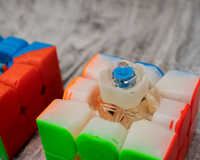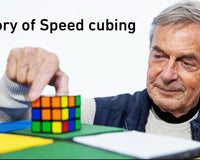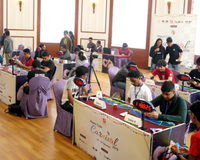The Rubik's Cube has captivated puzzle enthusiasts around the world for decades. While it may seem like an impossible task to solve, there are various methods that have been developed to help speed up the solving process. One such method is CFOP (Cross, F2L, OLL, PLL), also known as the Fridrich method. CFOP is widely regarded as one of the most efficient and popular speedsolving techniques. In this blog, we will explore strategies and tips on how to learn CFOP faster.
Watch: How To Be Sub-30 On 3x3 cube | Easiest 30 second solve | CFOP | Sarthak Masta | Cubelelo
-
Understand the Basics
Before diving into CFOP, it's essential to have a solid grasp of the basic Rubik's Cube-solving techniques. Familiarize yourself with the cube's structure, notation, and fundamental algorithms. Learn how to solve the first two layers using intuitive methods or simpler algorithms like the beginner's method. This foundation will provide a smoother transition when you start learning CFOP.
For more Watch: How to Solve a 3x3 Rubik's Cube | Cubelelo
-
Master the Cross

The first step in CFOP is solving the cross. The cross is one of the most important parts of the solve! Practice solving the cross efficiently and quickly by looking up example solves from various cubers on YouTube. Practice look ahead to plan your next moves while solving the cross. This will make you more efficient.
Watch: Beginner and Advanced Cross Tutorial by Aryan Chhabra | Hindi | Cubelelo
-
Intuitive F2L

F2L (First Two Layers) is the next phase of CFOP. Instead of relying solely on algorithms, aim to solve the first two layers using intuitive methods. Understand the underlying concepts and patterns involved in F2L. By recognizing and exploiting these patterns, you can solve F2L pairs more efficiently. Consistent practice and pattern recognition will gradually reduce your solve times.
Watch: Beginners F2L Tutorial by @AryanChhabra | Hindi | Cubelelo
-
Algorithmic OLL and PLL

Once you have mastered the cross and F2L, it's time to learn the final two stages of CFOP: OLL (Orientation of the Last Layer) and PLL (Permutation of the Last Layer). OLL involves orienting all the pieces of the last layer, while PLL focuses on permuting them correctly. Start by learning a few algorithms for each case and gradually expand your repertoire. Practice these algorithms repeatedly until they become second nature. Use triggers to learn algorithms faster and finger tricks to execute them swiftly and fluidly.
Watch these Videos: To Learn Full OLL and PLL
-
Use Resources and Tools

xSkills Courses by Cubelelo
Utilize the wealth of resources available to aid your learning process. Online tutorials, video guides, and interactive solving platforms can provide valuable insights and tips from experienced cubers. A perfect example of this is our very own learning platform for all levels in cubing called “Xskills”. Make sure to check it out! Apart from that, websites and mobile apps dedicated to Rubik's Cube solving can assist in memorizing algorithms and tracking your progress. Additionally, consider joining online communities or attending Rubik's Cube competitions to connect with fellow enthusiasts and exchange knowledge.
-
Consistent Practice and Solve Challenges
Improving your CFOP speed relies heavily on consistent practice. Allocate regular practice sessions to work on specific steps or overall solve times. Use a timer to track your progress and set goals for improvement. Participate in competitions to push yourself further and gain experience in solving under pressure. The more you practice, the more comfortable and proficient you will become with CFOP.

Analyze and Optimize
After each solve, take the time to analyze your approach and identify areas for improvement. Review your solve times, recognize inefficiencies, and seek opportunities for optimization. Analyze algorithms, finger tricks, and look-ahead techniques employed by expert cubers to refine your solving style. Continuous analysis and optimization will help you refine your CFOP skills and decrease solve times over time.
Solve Analysis: Get your solves analyzed by the Best Speedcubers
Conclusion
Learning CFOP is a journey that requires dedication, patience, and consistent practice. By applying these tips in your cubing journey, you can accelerate your learning process. Remember to focus on analyzing your solves for improvement because it’s the most important step toward getting better at CFOP!
About Author

Sarthak Masta
Sarthak Masta is a speedcuber from Raipur. He started cubing in 2013 and now has 9 years of cubing experience. Apart from cubing, Sarthak enjoys making music and singing. He has attended a total of 7 competitions in Raipur and has gotten 10 podiums, with 2 gold medals, 4 silver medals and 4 bronze medals.






























